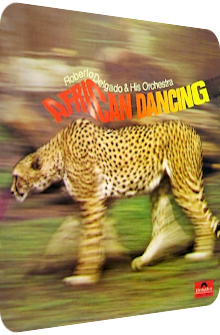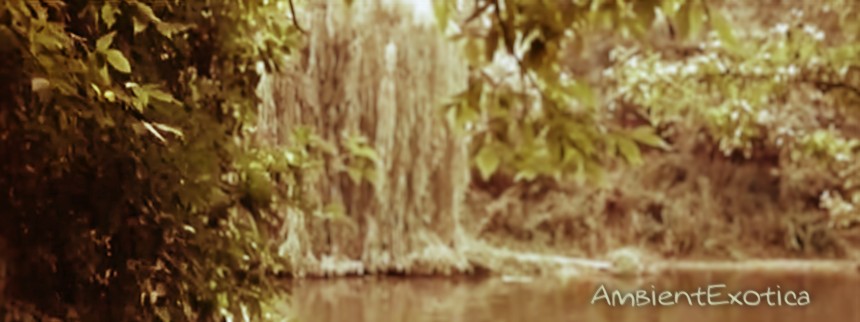
Roberto Delgado
African Dancing
1970
All big orchestra leaders of the late 50’s who are still alive in the 70’s face the same problem: the rise of new genres (Rock and Funk), electronic devices (Moog and Fender Rhodes) and the necessity to cope with a different public sphere. Them youths turn to The Beatles, The Shadows and The Who, so big band setups and bandleaders come up with a different tactic, be they called Stanley Black, Geoff “Manuel” Love or Roberto Delgado. Born as Horst Wende (1919–1996) and a composing marimbaphonist to reckon with, he embodies the typical European attitude of that time: absorbing the British style and embroidering it in the record for better or worse. Friends like Bert Kaempfert worked out a similar formula. In the 70’s, then, blaxploitation films and African music are on the rise, or, you know, that thing that is advertised as African music.
Geoff Love comes up with his Exotica Funk project Mandingo while Horst Wende remains fond of his Delgado moniker, delivering a work on Polydor that is called African Dance. Released in 1970, 12 titles cross the path of the Exotica listener, one of them created by the bandleader himself. Manfred “Fred” Moch and Ack van Rooyen accompany him on their trumpets, with several session musicians beating bomgos, playing flutes, shaking maracas. One can expect a lighthearted, diaphanous safari through presumed African steppes, but few and far between there are surprises, be they smoking-fast or unexpectedly mysterious.
Openers are an ever-important business, but in case of Africa-themed albums, they are the benchmark, the opportunity to test the water. Philemon Hou’s Grazing In The Grass is that opportunity, and Delgado and his men take the chance to enchant with wake-up cowbell calls, slapped kalimba strings, Fred Moch’s trumpet and of course Delgado’s own ligneous marimba. The atmosphere is as expected: faux/plastic Africana. Neither the flute, let alone the lava organ can change anything about it. But that’s also one potential seal of quality.
Fadhili William’s Malaika revs up the jungle drums with green bongo blotches and a benignant sunset-colored flute polyphony, whereas Kim Phillip’s Serengeti is the archetypical big band pre-Funk escapade, lacking the wah wah guitars but still sporting the farting tubas and cool bongos amidst the mellifluous flute washes. Jerry Ragovoy’s and Miriam Makeba’s famous Pata Pata then grooves along with canned thermal heat in organ form, brass protrusions and weird syrinx blasts that are just off-key enough to boost the exoticism. Roberto Delgado’s own African Call offers a tasty plasticity of marimba hollowness in-between guitar-accentuated bongo beats of amicability before Mackay Davashe and his Kilimanjaro finishes side A with a surprisingly mosh pit-compatible array of rhythms; were it not for the polyfoil brass scents and mamba marimba, chances are that this would smell like Metal.
Side B continues Roberto Delgado’s jungular journey: Tony Perdone’s Patatalo kicks off side B with its 6/8 marching beat of Haitian flavor, screeching flutes and the constant ubiquity of the traversing marimba as a rhythmic device. The Skokiaan by August Msarurgwa is a pre-Drum & Bass tunnel vision of laid-back yet fast-paced marimba fusillades, maraca streamlets, steamy organs and lovely flute concoctions, while E. Gilbert‘s Tara Din Din proves to be the exact opposite: slow as molasses and schlepping itself forward with the help of dun-colored organs and recondite clarinet sparks, this tune is surprisingly enigmatic and mysterious.
This state doesn’t last overly long though, as John Kongos’ Won’t You Join Me sees Roberto Delgado unfurl another 6/8 beat with droning bass guitar cataracts and an increasingly multilayered euphony of magenta horns and ebullient flutes. This festivity is picked up by Ricardo Bornman Umfaan whose maraca rhythm is the fuel for the soul train. Moving like a steely vehicle, the harsh reality is once again transfigured via warm flute tones, two lead trumpets and various marimba vesicles. The traditional Wimoweh aka The Lion Sleeps Tonight is the endpoint of the sun-kissed tour d’Afrique, providing a chintzy burst of colors, horn helixes and an electric bass that drowns the listener in friendliness. With not a thing to worry about, the listener abides.
Roberto Delgado’s African Dancing is a typical artifact of the African craze, a clear-cut part of the dawn of blaxploitation movies, picturesque safaris and the endeavor of propagating mutual friendship and understanding. Such things obviously – and obliviously – fail, neither making this an album of ethno ditties nor world muzak, but a work as seen through the eyes of a big band leader. On the plus side, said leader happens to be a marimba player, and that mallet instrument does work really well in this surrounding, luring the bystander with that verdured vibe, that kind of superb fidelity that is otherwise often amiss in the arrangements. But blimey, African Dancing feels like a MIDI brass album more often than not. It is as if Larry Elgart’s Latin Obsession (1989) is foreshadowed, though Delgado’s album is by no means a half-arsed low-budget product.
However, Delgado tames the lion, unfortunately so. Fred Moch, Ack van Rooyen and fellows can only do so much when the volume – and voluminosity – of their instruments is streamlined and narrowed down. No eclectic solo, no convoluted melody, no labyrinthine intersection ever graces African Dancing, and this proves to be a missed opportunity. With the toned down arrangements comes a reduction in colors. Delgado’s work is not overwhelmingly awash with colors. It is really the marimba and the bongos that carry the interpretations. If a friendly vision of faux Africa is on the agenda though, then African Dancing delivers. It is available on vinyl, CD, digitally and on streaming services.
Exotica Review 423: Roberto Delgado – African Dancing (1970). Originally published on Mar. 28, 2015 at AmbientExotica.com.
